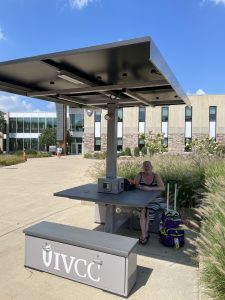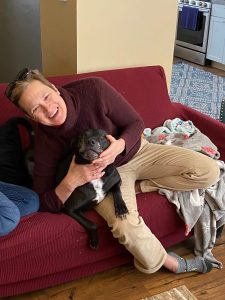Hispanic Heritage Month events bring culture
October 12, 2017
llinois Valley Community College celebrated Hispanic Heritage Month in September. The Diversity Team presented four different events.
Mexican Food Demonstration
“Mexican Food Demonstration” was the fourth and final event that celebrated Hispanic Heritage Month. The Oct. 2 demonstration was hosted by owner Enrique Delgado and chef Gustavo Monjaras of Jalapeno’s restaurant in Peru.
With the help of audience volunteers, the pair prepared guacamole, salsa and cheese quesadillas.
Monjaras prepared the restaurant’s famous guacamole with a traditional stone tool known as a molcajete in Spanish and mortar and pestle in English.
The recipe was simple, consisting only of avocados, jalapenos, tomatoes, onions, cilantro, salt and garlic salt.
Monjaras then made salsa with the help of Frank Gondwe, a recent transfer student from the United Kingdom. A blender was used to prepare the salsa and Gondwe distributed samples to the audience while wearing a hot pink sombrero.
The final recipe demonstration was a cheese quesadilla. IVCC students Brian Tondi and Ashley Diaz assisted Monjaras by combining only three ingredients to make the quesadillas: tortillas, butter and cheese. Delgado explained that quesadillas can also be prepared with chorizo (pork sausage), shrimp and ground beef.
After the demonstrations were finished, audience members were given the opportunity to taste the recipes. Chips, salsa, guacamole and cheese quesadillas were paired with horchata and a hibiscus drink. Horchata is a traditional Mexican rice beverage that is prepared with cinnamon, rice and cream.
The demonstration was translated by Sara Escatel, Director of Adult Education. According to Escatel, this was the third time that Jalapeno’s has visited campus to present their recipes.
“We invite Jalapeno’s to do this event every year,” said Escatel. She said authentic Mexican food was a great way to celebrate Hispanic Heritage Month.
Growing Up Hispanic in the Illinois Valley
LaMoille CUSD 303 Superintendent Dr. Ricardo Espinoza spoke Sept. 27 at IVCC on “Growing up Hispanic in the Illinois Valley and Achieving Success” as part of Hispanic Heritage Month.
“It’s real important that you understand that this presentation is more about you and your lives and less about me in terms of what I’ve done,” said Espinoza. Espinoza emphasized the value of an education and the people who support you.
He was born in Chicago, but his family then moved to Mendota for a safer environment. He proudly credited his parents for giving him and his six siblings the support they needed to succeed.
“Growing up, we were dirt poor, but yet my parents made something of us.”
Teaching is Espinoza’s passion. He loves his job, and it is obvious from the enthusiasm in his voice that he is in his element when teaching. He wants others to find the same happiness.
You need to have “a passion for your occupation: occupassion,” Espinoza said. “It’s also about lifelong learning. It’s about learning and leading, and leading and learning.”
He highlighted the irreplaceable value of education, calling it “the great equalizer.”
Discussing barriers to education, he emphasized the need for a desire to learn. Espinoza believes that “money should not be an issue” because you can borrow it, and education is of far more lasting value.
“They can repossess your car, they can repossess your house, they can even repossess your bicycle, but they can’t repossess your education. They can make you pay your student loans, but that’s okay, because you’re working.”
He said his story and everyone’s story would not be possible without the people who help along the way.
He thanked the “individuals who took the time to teach, to care, to inspire, and to share dreams and aspirations to a young Hispanic kid who needed guidance. So, this is why I am here today to pay it forward. I truly believe that in order for us to succeed, what we need to do is we need to help others to succeed.”
He discussed the need for Hispanics to take leadership roles, both to show it can be done and simply to accomplish what needs to be done.
“The district didn’t hire me (as superintendent) because I was Hispanic,” Espinoza said. “They hired me because of what I could do and we’ve done it for the last five years.
“And so, yes, the challenge is there. Yes, there were people that said ‘no, you shouldn’t do it,’ and I said ‘no, I’m sorry, with all due respect, it has to be done, because our children, whatever color they may be, have to see us other than the manual labor, other than the regular labor.’”
He emphasized there is pride in manual labor, saying, “there’s nothing wrong with it. Believe you me, I’ve done it before. You name the job, I’ve done the job. You have to do that job to be able to appreciate the job you currently have or will have.”
“We can’t make excuses,” he said. “Whatever the culture war is right now.”
He then highlighted a point from Dr. Martin Luther King Jr.’s “I Have a Dream” speech.
“But we refuse to believe that the bank of justice is bankrupt,” Espinoza read from King’s speech. “We refuse to believe that there are insufficient funds in the great vaults of opportunity of this nation. And so, we’ve come to cash this check, a check that will give us upon demand the riches of freedom and the security of justice.”
“It’s there, folks,” said Espinoza. “It’s there for you to take it. It’s not bankrupt. I don’t care what anybody says.”
He summarized his advice to students.
“I could spend hours and hours and hours talking to you about discrimination and about barriers and everything else,” Espinoza said.
“You all know it. You all see it. Everybody has barriers. Everybody gets involved with discrimination at one point or the other.
“And that’s not what this is about. This is more about lifting your spirits, inspiring you to do the right things, inspiring you to get that education you need to get so that you can pay it forward.”



